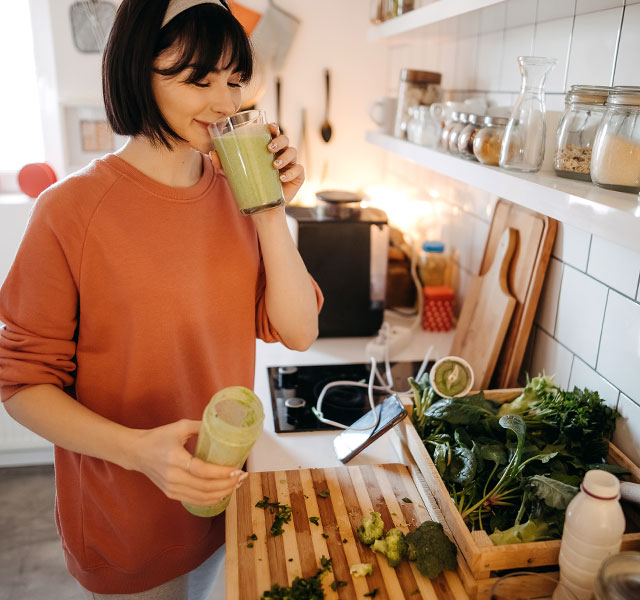Eating a healthy diet filled with plenty of vitamins and minerals is always important, but it can be especially so when you are at home recovering from COVID. While over-the-counter pain relievers like Tylenol might alleviate some of your symptoms in the moment, it’s also important to fill your body with the nourishing foods it needs to help you make a full recovery.
“Some people rely on supplements to help them recuperate, but nothing is better than fresh fruits and vegetables,” says Bethany Thayer, RDN, a registered dietitian nutritionist at Henry Ford Health. “There are no supplements that have evidence of immune support and recovery. Eating foods that are as close to their natural state as possible is best.”
Here’s what to eat and drink when you have COVID—and how to navigate eating when you have nausea or an altered sense of taste.
- Up your fluid intake. “You should be hydrated enough so that your urine is almost clear,” says Thayer. If you have diarrhea or if you’re sweating from a fever or chills, make sure you have salt or a little sugar in your fluids—think broths, fresh juices or electrolyte solutions like Gatorade—because salt and sugar can help you retain water. "Staying hydrated is one of best of ways you can help your body along," she adds. "Especially if you have a fever, fluids help you to better regulate your temperature."
- Load up on vitamin C-packed fruits and vegetables. Kiwis, berries, oranges, sweet potatoes, peppers—these all have lots of vitamin C, which support immune health. Put them in a salad or smoothie.
- Eat protein. Protein improves healing capacity—after all, it is the building block of all cells, including immune cells. Lean chicken and turkey are good sources of protein. They’re also good sources of zinc, a mineral that supports the immune system. Try chicken noodle soup with ginger and vegetable pieces in it—you’ll increase your fluid intake and get immune-supporting nutrients.
- Eat foods with vitamin D. Vitamin D also helps support your overall immune health and many people are deficient in it—especially those who live in colder climates like the Midwest. Try salmon or tuna, egg yolks, milk or orange juice. If you know you are deficient, talk to your doctor, who may recommend taking a vitamin D supplement.
If you’re still stuck on what to eat, know that you can’t go wrong with eating whole foods. “Eating foods from the food groups without added sugar, salt and saturated fat are the best sources of vitamins and minerals," says Thayer.
What If You Have Nausea Or An Altered Sense Of Taste?

Treatments For COVID
Of course, if you are nauseous, it might be hard to maintain a healthy diet. There are a few natural remedies you can use to tame nausea. “Ginger tea can be really helpful for managing nausea," says Thayer. "You can also try mint tea. Even smelling peppermint or sniffing alcohol pads can help alleviate nausea.” Acupressure, or applying pressure at specific points on the body, can also be helpful, as it stimulates certain nerves that tells the brain to release nausea-relieving hormones.
If you aren’t nauseous but you're experiencing an altered sense of taste, food might not taste great—so you might not care about what you eat. Some might lean toward easy, overly processed foods or sugar. But it’s important to eat healthy foods, as nourishing your body will help you recuperate. And if you have an altered sense of taste or smell, eating may help bring it back.
“One of the mechanisms behind loss of smell and taste is destruction of the cells that support your olfactory (or smelling) nerves, so taking good care of yourself during that recovery period—getting good nutrition, getting good rest, giving your body what it needs to recover—will help bring those senses back,” says Thayer. “Good self-care is absolutely critical.”
Reviewed by Bethany Thayer, MS, RDN, director of the Henry Ford Center for Health Promotion and Disease Prevention. Read more of Bethany's articles.


